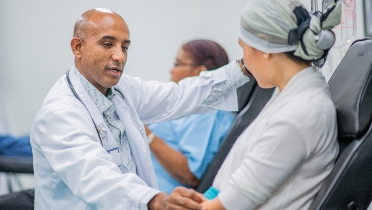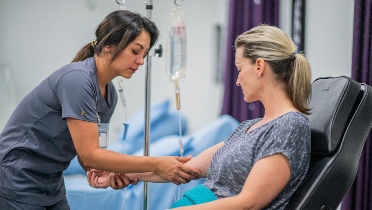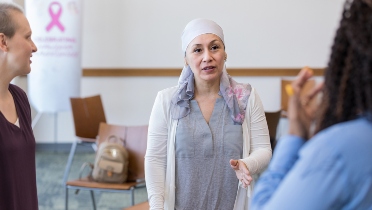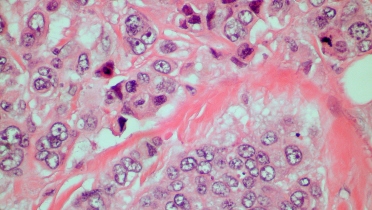Loading the player...
Adjuvant Olaparib Significantly Improves Invasive DFS in Patients with High-Risk EBC, BRCA Mutations
A 1-year course of adjuvant olaparib following neoadjuvant or adjuvant chemotherapy significantly improved invasive disease-free survival (iDFS) and distant disease-free survival (dDFS) in patients with high-risk, BRCA–mutated HER2–negative early breast cancer, according to results from the OlympiA study presented at the 2021 ASCO Annual Meeting.
Approximately 5% to 10% of patients diagnosed with breast cancer in the US harbor germline BRCA mutations, which carry an increased risk for recurrence. Olaparib, a PARP inhibitor, is approved for the treatment of patients with metastatic, BRCA–mutated HER2–negative breast cancer.
The phase 3, double-blind OlympiA trial enrolled 1,836 patients with high-risk early breast cancer and confirmed BRCA mutations previously treated with neoadjuvant (50.1%) or adjuvant (49.9%) chemotherapy. The majority of patients (82.2%) had triple-negative breast cancer.
Researchers randomly assigned patients to continuous oral olaparib (300 mg twice per day; n = 921) or placebo (n = 925) for 1 year. Patients were permitted to receive endocrine therapy or bisphosphonates in addition to their assignment.
iDFS served as the study’s primary endpoint, with dDFS, OS and safety serving as secondary endpoints.
After a median follow-up of 2.5 years, olaparib showed a significant iDFS benefit when compared with placebo (hazard ratio [HR], 0.58; 99.5% CI, 0.41-0.82; P < .0001), after which an independent data monitoring committee recommended that data be unblinded at the interim analysis. The researchers observed 108 iDFS events among patients assigned olaparib and 178 events among patients assigned placebo.
There was an 8.8% difference in 3-year iDFS between the olaparib and placebo arms (85.9% vs. 77.1%; 95% CI, 4.5-13), and olaparib was shown to significantly improve 3-year dDFS (87.5% vs. 80.4%; HR, 0.57; 99.5% CI, 0.39-0.83; P < .0001).
An OS analysis favored olaparib but did not reach statistical significance at the interim analysis (3-year OS, 92% vs. 88.3%; HR, 0.68; 99% CI, 0.44-1.05).
The researchers observed no new safety signals with olaparib.
Olaparib did not increase rates of adverse events of special interest—such as myelodysplastic syndrome, acute myeloid leukemia, new primary malignancies and pneumonitis—when compared with placebo, nor were rates of serious adverse events significantly increased.
“OlympiA’s findings highlight the need for genetic testing for BRCA mutations in patients diagnosed with high-risk early-stage breast cancer,” said Lori Jo Pierce, MD, FASTRO, FASCO, president of ASCO. “These results could have an important impact on treatment decisions for this patient population, possibly including the use of a PARP inhibitor in the adjuvant setting.”
“The OlympiA study results, the first reporting the effects of a PARP inhibitor as an adjuvant therapy on survival endpoints, suggest a possible addition to the standard of care for patients with germline BRCA1/2 mutation-associated early breast cancer who have levels of recurrence risk requiring neoadjuvant or adjuvant chemotherapy,” Andrew Tutt, MBChB, PhD, FMedSci, head of the division of breast cancer research and director director of the Breast Cancer Now Toby Robins Research Centre, Institute of Cancer Research and Guy’s Hospital King’s College London, said in a press release.
Disclosure: Tutt has stock and other ownership in InBiomotion; receives honoraria from Medscape and Prime Oncology, consults or advises for Artios, AstraZeneca, Merck Serono, Pfizer, and Prime Oncology; and receives research funding from Artios, AstraZeneca, Merck KgaA, and Roche/Genentech. For remaining disclosures, as well as those of the other authors, please see the abstract.
By Cameron Kelsall, /alert Contributor
Approximately 5% to 10% of patients diagnosed with breast cancer in the US harbor germline BRCA mutations, which carry an increased risk for recurrence. Olaparib, a PARP inhibitor, is approved for the treatment of patients with metastatic, BRCA–mutated HER2–negative breast cancer.
The phase 3, double-blind OlympiA trial enrolled 1,836 patients with high-risk early breast cancer and confirmed BRCA mutations previously treated with neoadjuvant (50.1%) or adjuvant (49.9%) chemotherapy. The majority of patients (82.2%) had triple-negative breast cancer.
Researchers randomly assigned patients to continuous oral olaparib (300 mg twice per day; n = 921) or placebo (n = 925) for 1 year. Patients were permitted to receive endocrine therapy or bisphosphonates in addition to their assignment.
iDFS served as the study’s primary endpoint, with dDFS, OS and safety serving as secondary endpoints.
After a median follow-up of 2.5 years, olaparib showed a significant iDFS benefit when compared with placebo (hazard ratio [HR], 0.58; 99.5% CI, 0.41-0.82; P < .0001), after which an independent data monitoring committee recommended that data be unblinded at the interim analysis. The researchers observed 108 iDFS events among patients assigned olaparib and 178 events among patients assigned placebo.
There was an 8.8% difference in 3-year iDFS between the olaparib and placebo arms (85.9% vs. 77.1%; 95% CI, 4.5-13), and olaparib was shown to significantly improve 3-year dDFS (87.5% vs. 80.4%; HR, 0.57; 99.5% CI, 0.39-0.83; P < .0001).
An OS analysis favored olaparib but did not reach statistical significance at the interim analysis (3-year OS, 92% vs. 88.3%; HR, 0.68; 99% CI, 0.44-1.05).
The researchers observed no new safety signals with olaparib.
Olaparib did not increase rates of adverse events of special interest—such as myelodysplastic syndrome, acute myeloid leukemia, new primary malignancies and pneumonitis—when compared with placebo, nor were rates of serious adverse events significantly increased.
“OlympiA’s findings highlight the need for genetic testing for BRCA mutations in patients diagnosed with high-risk early-stage breast cancer,” said Lori Jo Pierce, MD, FASTRO, FASCO, president of ASCO. “These results could have an important impact on treatment decisions for this patient population, possibly including the use of a PARP inhibitor in the adjuvant setting.”
“The OlympiA study results, the first reporting the effects of a PARP inhibitor as an adjuvant therapy on survival endpoints, suggest a possible addition to the standard of care for patients with germline BRCA1/2 mutation-associated early breast cancer who have levels of recurrence risk requiring neoadjuvant or adjuvant chemotherapy,” Andrew Tutt, MBChB, PhD, FMedSci, head of the division of breast cancer research and director director of the Breast Cancer Now Toby Robins Research Centre, Institute of Cancer Research and Guy’s Hospital King’s College London, said in a press release.
Disclosure: Tutt has stock and other ownership in InBiomotion; receives honoraria from Medscape and Prime Oncology, consults or advises for Artios, AstraZeneca, Merck Serono, Pfizer, and Prime Oncology; and receives research funding from Artios, AstraZeneca, Merck KgaA, and Roche/Genentech. For remaining disclosures, as well as those of the other authors, please see the abstract.
By Cameron Kelsall, /alert Contributor
.jpg)
















.jpg)

.jpg)
.jpg)
.jpg)
.jpg)

.jpg)
.jpg)

.jpg)
.jpg)
.jpg)
_.jpg)
.jpg)
.jpg)
.jpg)
.jpg)




.jpg)
.jpg)

.jpg)

.jpg)
.jpg)
.jpg)
.jpg)

.jpg)
.jpg)
.jpg)
.jpg)

.jpg)
.jpg)

.jpg)

.jpg)
.jpg)
.jpg)
.jpg)
.jpg)
.jpg)
.jpg)
.jpg)
.jpg)
.jpg)
.jpg)
.jpg)

.jpg)
.jpg)

.jpg)
.jpg)
.jpg)
.jpg)
.jpg)
.jpg)




.jpg)
.jpg)
.jpg)




.jpg)
.jpg)
.jpg)
.jpg)




.jpg)
.jpg)
.jpg)

.jpg)
.jpg)
.jpg)

.jpg)
.jpg)
.jpg)
.jpg)
.jpg)
.jpg)
.jpg)
.jpg)
.jpg)
.jpg)
.jpg)

.jpg)
.jpg)
.jpg)

.jpg)
.jpg)
.jpg)
.jpg)
 Featured Breast Cancer Videos
Featured Breast Cancer Videos.jpg)